
RookieAI_yolov8
基于yolov8实现的AI自瞄项目 AI self-aiming project based on yolov8
Stars: 340
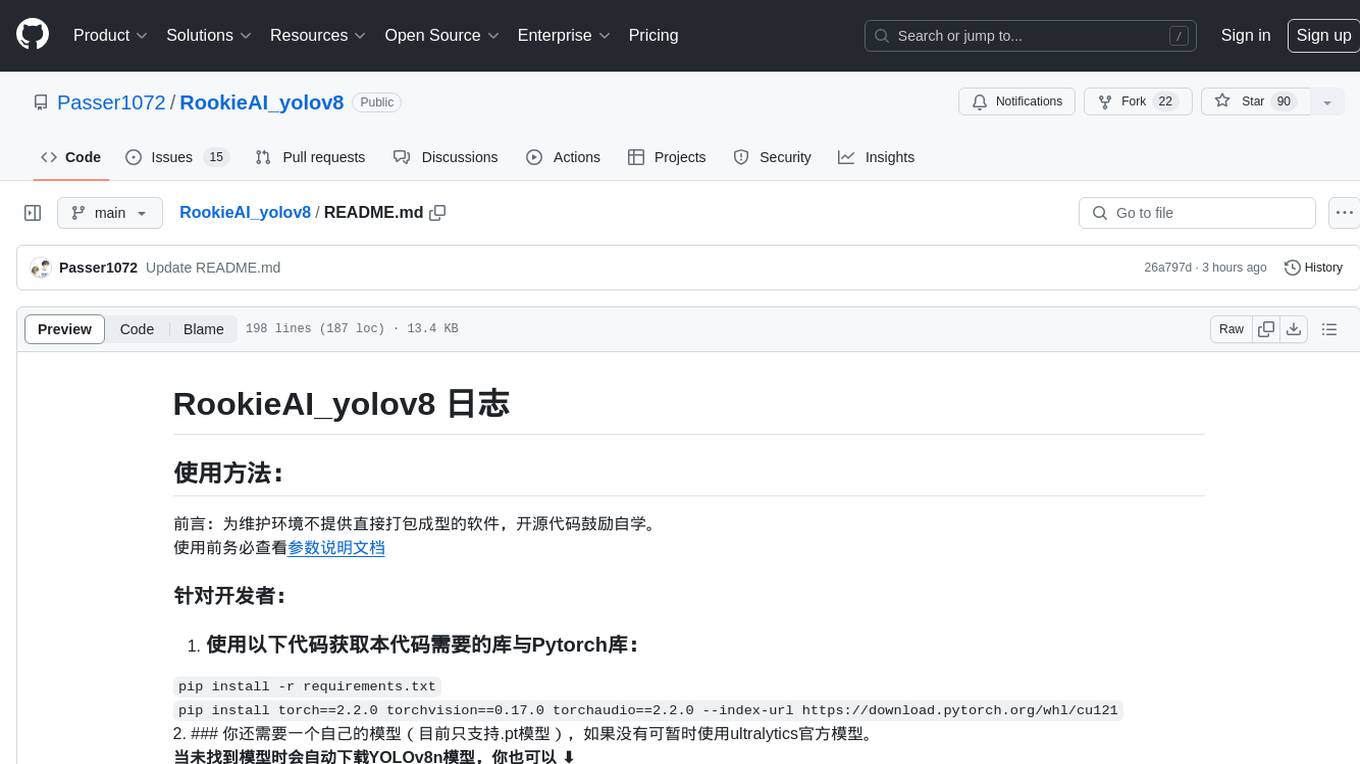
RookieAI_yolov8 is an open-source project designed for developers and users interested in utilizing YOLOv8 models for object detection tasks. The project provides instructions for setting up the required libraries and Pytorch, as well as guidance on using custom or official YOLOv8 models. Users can easily train their own models and integrate them with the software. The tool offers features for packaging the code, managing model files, and organizing the necessary resources for running the software. It also includes updates and optimizations for better performance and functionality, with a focus on FPS game aimbot functionalities. The project aims to provide a comprehensive solution for object detection tasks using YOLOv8 models.
README:
[!IMPORTANT] 使用前请先阅读参数解释文档
[!NOTE] 前言:为什么不提供直接打包成型的软件?
每个程序都有独立的特征码,如果大家都使用同一个程序,一旦其中一个人被BAN其他人会被联BAN。所以鼓励大家自行修改部分代码并自行打包即可避免此类情况发生。
| Version | Python |
|---|---|
2.4.3或更早 |
3.7+ |
2.4.4.2+ |
3.10+ |
- 使用以下代码获取本代码需要的库与Pytorch库
✨ 超高速无痛下载 ✨
pip install -r requirements.txt -i https://pypi.doubanio.com/simple/
pip uninstall torch torchvision torchaudio
pip install torch torchvision torchaudio -f https://mirror.sjtu.edu.cn/pytorch-wheels/torch_stable.html --no-index海外用户请使用以下命令
pip install -r requirements.txt
pip uninstall torch torchvision torchaudio
pip install torch torchvision torchaudio -f https://download.pytorch.org/whl/torch_stable.html --no-index-
你还需要一个自己的模型(目前支持.pt/.engine/.onnx模型),如果没有可暂时使用ultralytics官方模型
-
当未找到模型时会自动下载YOLOv8n模型,你也可以⬇️
访问YOLOv8GitHub界面获取更多官方yolov8模型以快速开始
访问ultralytics官网查看官方网站帮助文档
- 运行
在脚本所在目录打开终端,键入以下内容并回车
python RookieAI.py建议自行训练
V3.0预告
3.0版本注重使用多线程进行优化,理论上可以提升截图效率与推理效率,但是可能会导致延迟问题。当然也提供原始的单进程推理模式可供选择。
该版本从底层代码到UI界面进行了完全重构,多线程也可以带来更多使用上的优化,例如可随意调整鼠标移动的频率,不再受到推理帧数的限制等。目前测试主系统空载YOLO使用YOLO11n模型推理的帧数从55提升到了80,有明显提升。配合独立的鼠标移动进程,理论上可以带来不错的使用体验。
对电脑配置的要求也会有一定程度的降低。代码目前处于早期开发阶段,未集成Aimbot等基础功能,开发进度与源代码请稍后关注对应文档。
推荐使用Atlas游戏系统配合boosterX性能优化软件获得更好体验
AtlasOS对 Windows 进行修改,专为游戏玩家设计。具有更高的游戏帧率和更低的延迟。同时在此系统上使用RookieAI可更高效的利用GPU资源得到更高的推理帧率。
boosterX是一款系统优化软件,优化Windows,降低延迟、提高 FPS。在AtlasOS系统上使用可进一步进行优化。
配置单: 截图模式:mss 截图高/宽:320 显卡:RTX4080M 模型:YOLOv8s_TheFinals_teammate_enemy_04.engine
原版windows空载运行RookieAI2.4.3 对比 AtlasOS 空载运行RookieAI2.4.3:
此项目最初目的为Apex的Aimbot,未考虑其他游戏,可能会出现因反作弊禁止WIN32移动方式而无法使用的情况!
已知游戏:VALORANT
面对日益增多的配置文件参数,我新建了参数解释文档,里面介绍了配置文件内所有参数的信息,前往参数解释文档查看。
❗V3支持KmBoxNet,VALORANT确认可用
🎉🎉🎉非常感谢由RicardoJoaquim提供的英文特别版本🎉🎉🎉
Current latest version: ###
For Tasks:
Click tags to check more tools for each tasksFor Jobs:
Alternative AI tools for RookieAI_yolov8
Similar Open Source Tools

RookieAI_yolov8
RookieAI_yolov8 is an open-source project designed for developers and users interested in utilizing YOLOv8 models for object detection tasks. The project provides instructions for setting up the required libraries and Pytorch, as well as guidance on using custom or official YOLOv8 models. Users can easily train their own models and integrate them with the software. The tool offers features for packaging the code, managing model files, and organizing the necessary resources for running the software. It also includes updates and optimizations for better performance and functionality, with a focus on FPS game aimbot functionalities. The project aims to provide a comprehensive solution for object detection tasks using YOLOv8 models.
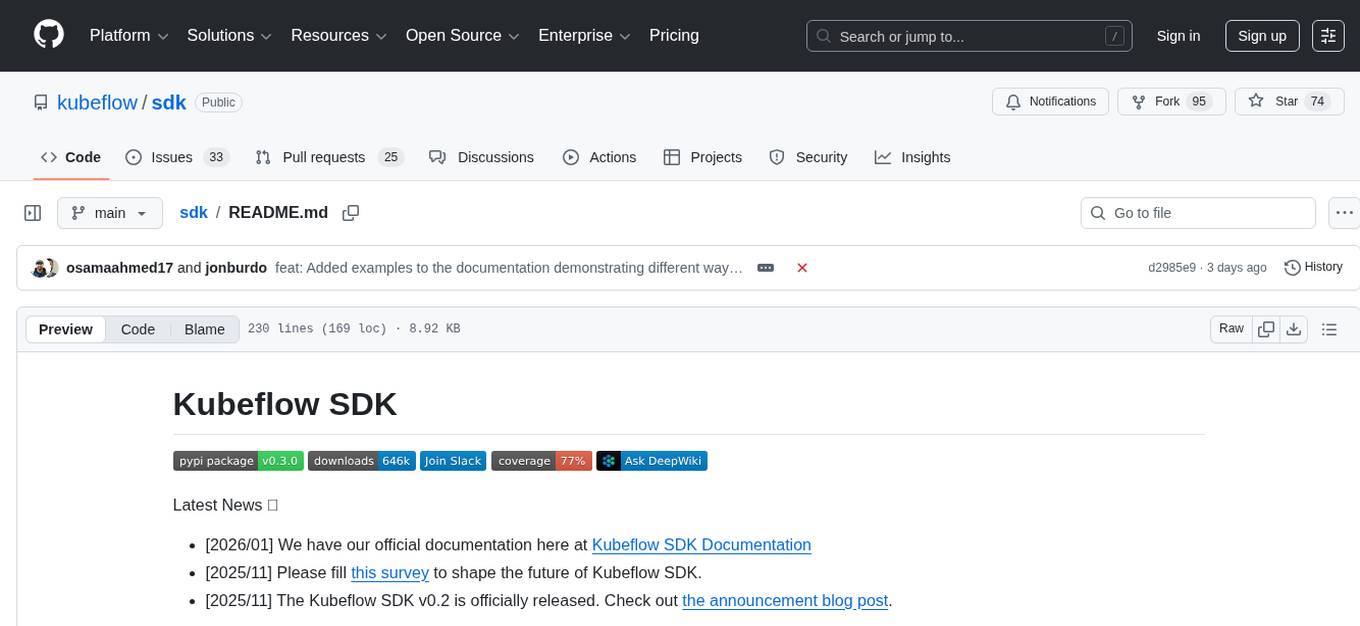
sdk
The Kubeflow SDK is a set of unified Pythonic APIs that simplify running AI workloads at any scale without needing to learn Kubernetes. It offers consistent APIs across the Kubeflow ecosystem, enabling users to focus on building AI applications rather than managing complex infrastructure. The SDK provides a unified experience, simplifies AI workloads, is built for scale, allows rapid iteration, and supports local development without a Kubernetes cluster.
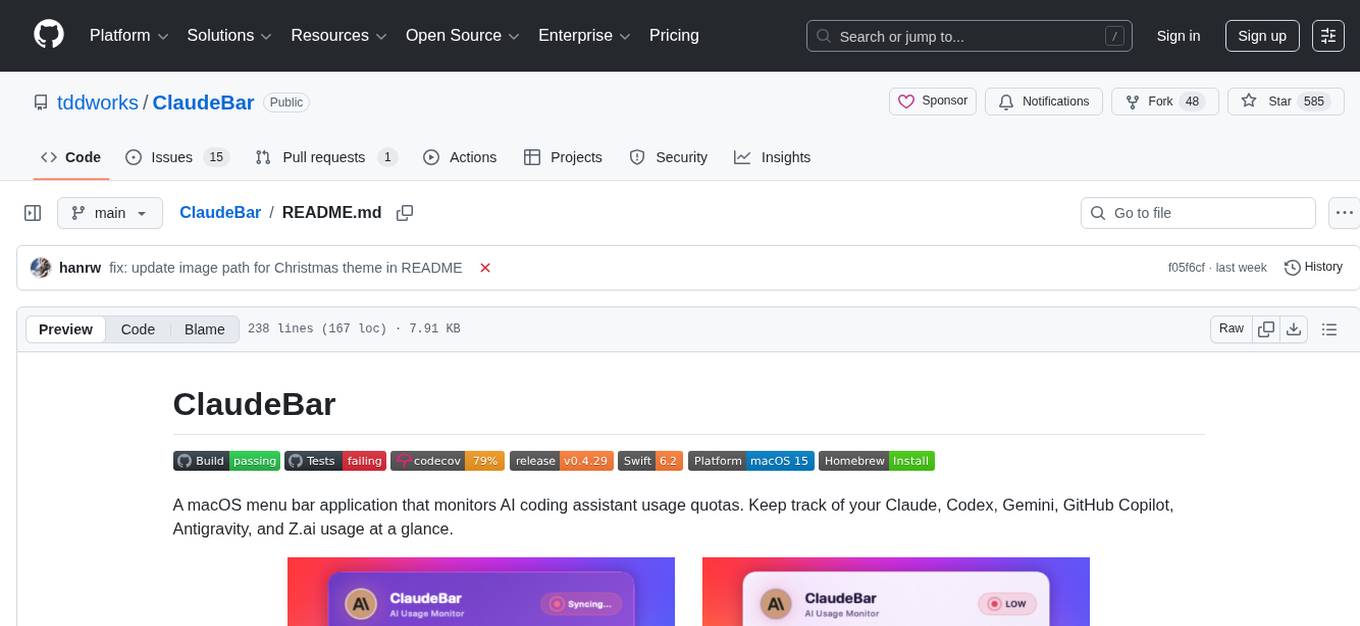
ClaudeBar
ClaudeBar is a macOS menu bar application that monitors AI coding assistant usage quotas. It allows users to keep track of their usage of Claude, Codex, Gemini, GitHub Copilot, Antigravity, and Z.ai at a glance. The application offers multi-provider support, real-time quota tracking, multiple themes, visual status indicators, system notifications, auto-refresh feature, and keyboard shortcuts for quick access. Users can customize monitoring by toggling individual providers on/off and receive alerts when quota status changes. The tool requires macOS 15+, Swift 6.2+, and CLI tools installed for the providers to be monitored.
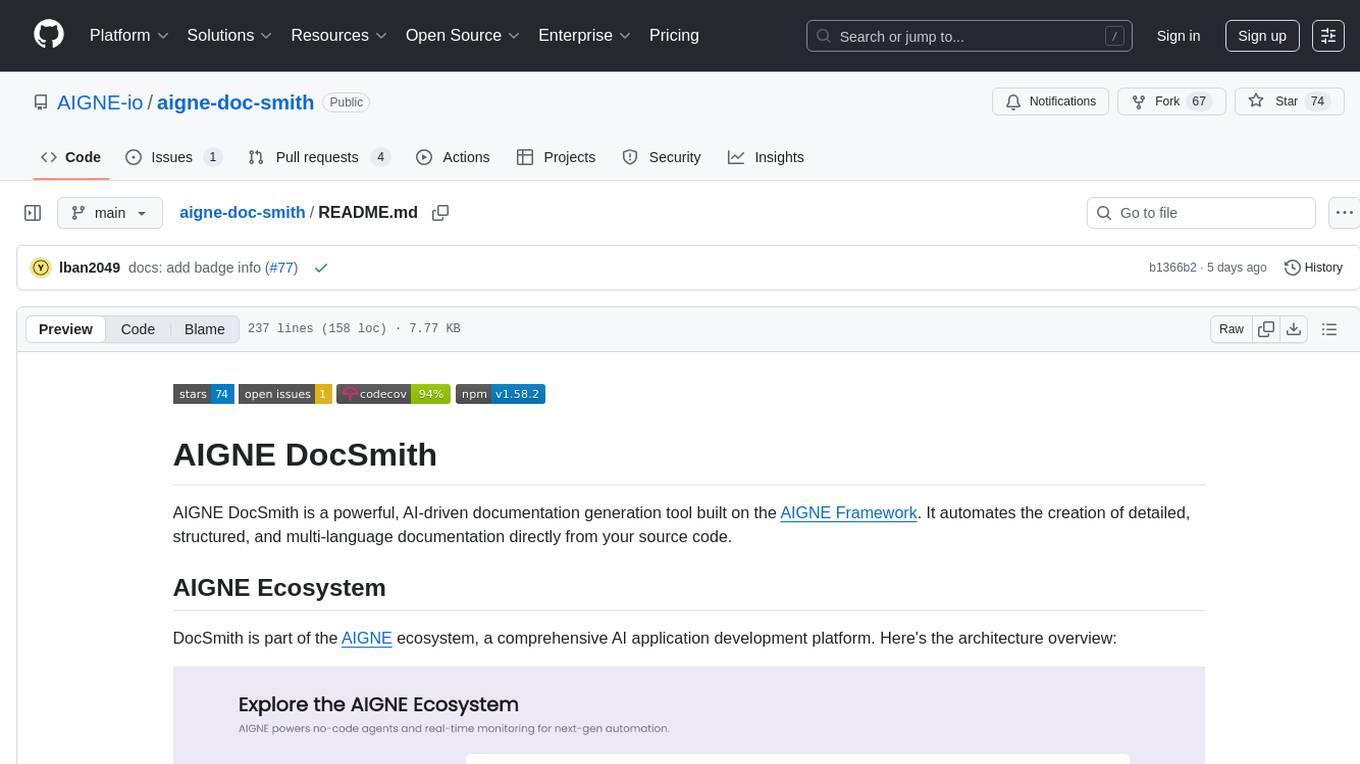
aigne-doc-smith
AIGNE DocSmith is a powerful AI-driven documentation generation tool that automates the creation of detailed, structured, and multi-language documentation directly from source code. It intelligently analyzes codebase to generate a comprehensive document structure, populates content with high-quality AI-powered generation, supports seamless translation into 12+ languages, integrates with AIGNE Hub for large language models, offers Discuss Kit publishing, automatically updates documentation with source code changes, and allows for individual document optimization.
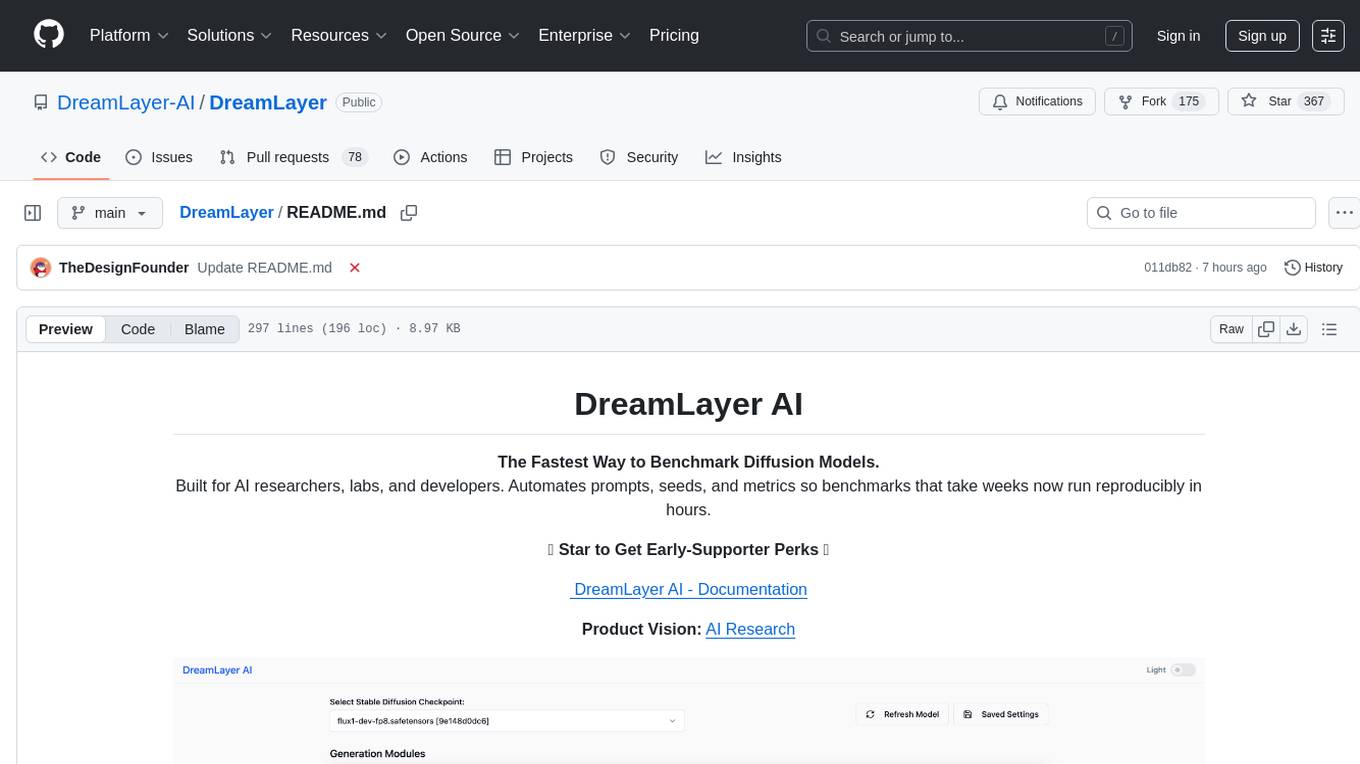
DreamLayer
DreamLayer AI is an open-source Stable Diffusion WebUI designed for AI researchers, labs, and developers. It automates prompts, seeds, and metrics for benchmarking models, datasets, and samplers, enabling reproducible evaluations across multiple seeds and configurations. The tool integrates custom metrics and evaluation pipelines, providing a streamlined workflow for AI research. With features like automated benchmarking, reproducibility, built-in metrics, multi-modal readiness, and researcher-friendly interface, DreamLayer AI aims to simplify and accelerate the model evaluation process.
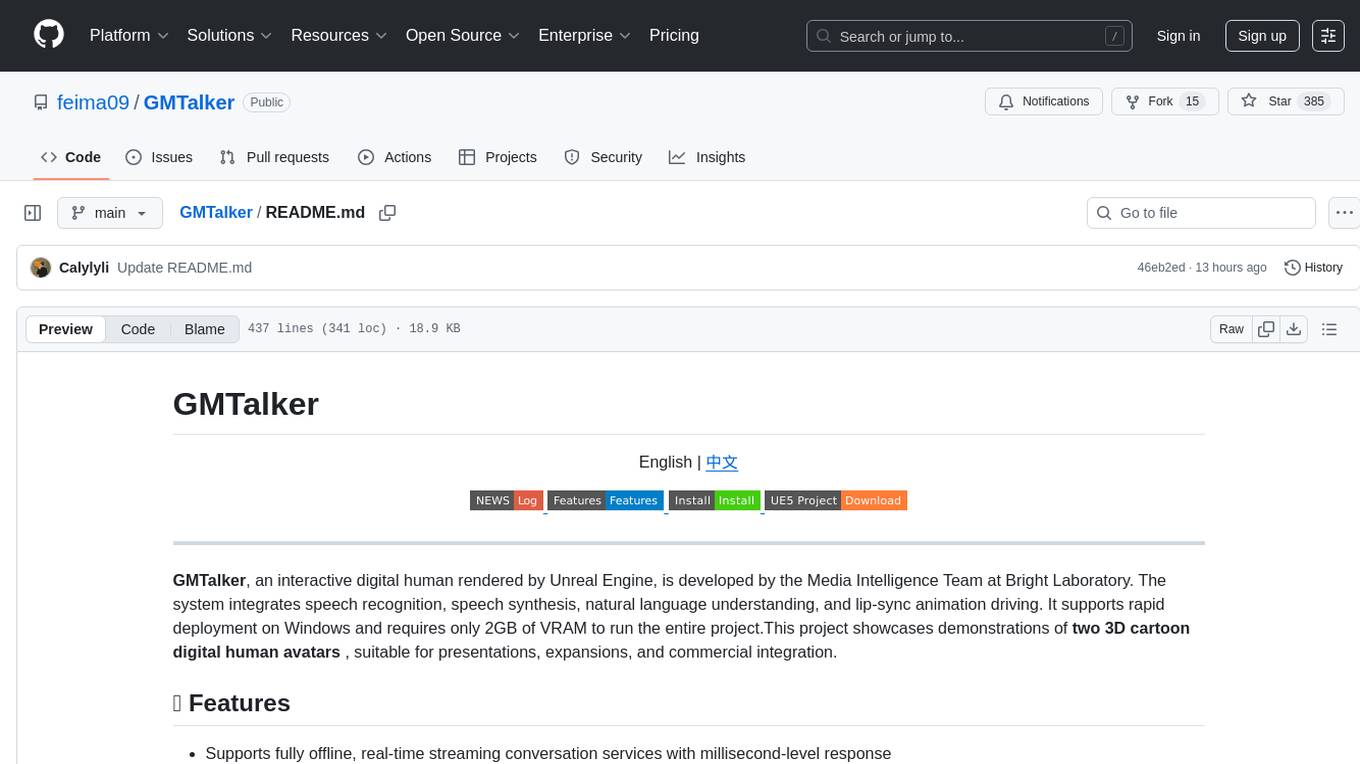
GMTalker
GMTalker is an interactive digital human rendered by Unreal Engine, developed by the Media Intelligence Team at Bright Laboratory. The system integrates speech recognition, speech synthesis, natural language understanding, and lip-sync animation driving. It supports rapid deployment on Windows with only 2GB of VRAM required. The project showcases two 3D cartoon digital human avatars suitable for presentations, expansions, and commercial integration.
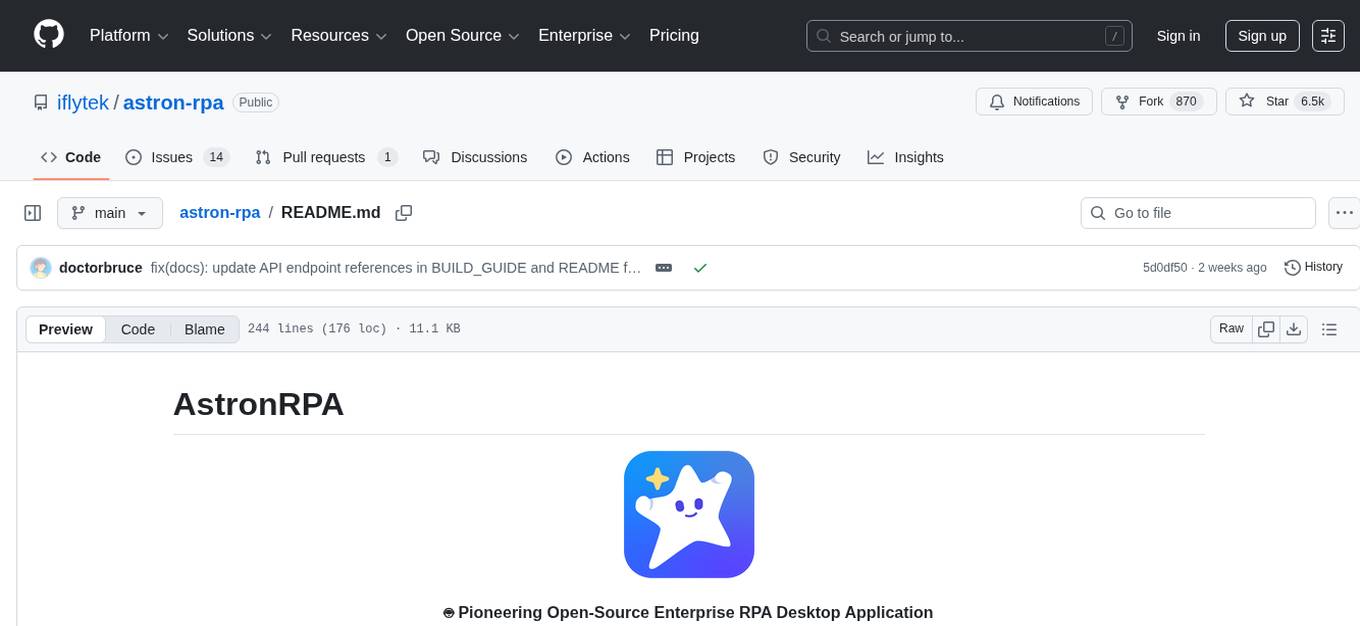
astron-rpa
AstronRPA is an enterprise-grade Robotic Process Automation (RPA) desktop application that supports low-code/no-code development. It enables users to rapidly build workflows and automate desktop software and web pages. The tool offers comprehensive automation support for various applications, highly component-based design, enterprise-grade security and collaboration features, developer-friendly experience, native agent empowerment, and multi-channel trigger integration. It follows a frontend-backend separation architecture with components for system operations, browser automation, GUI automation, AI integration, and more. The tool is deployed via Docker and designed for complex RPA scenarios.
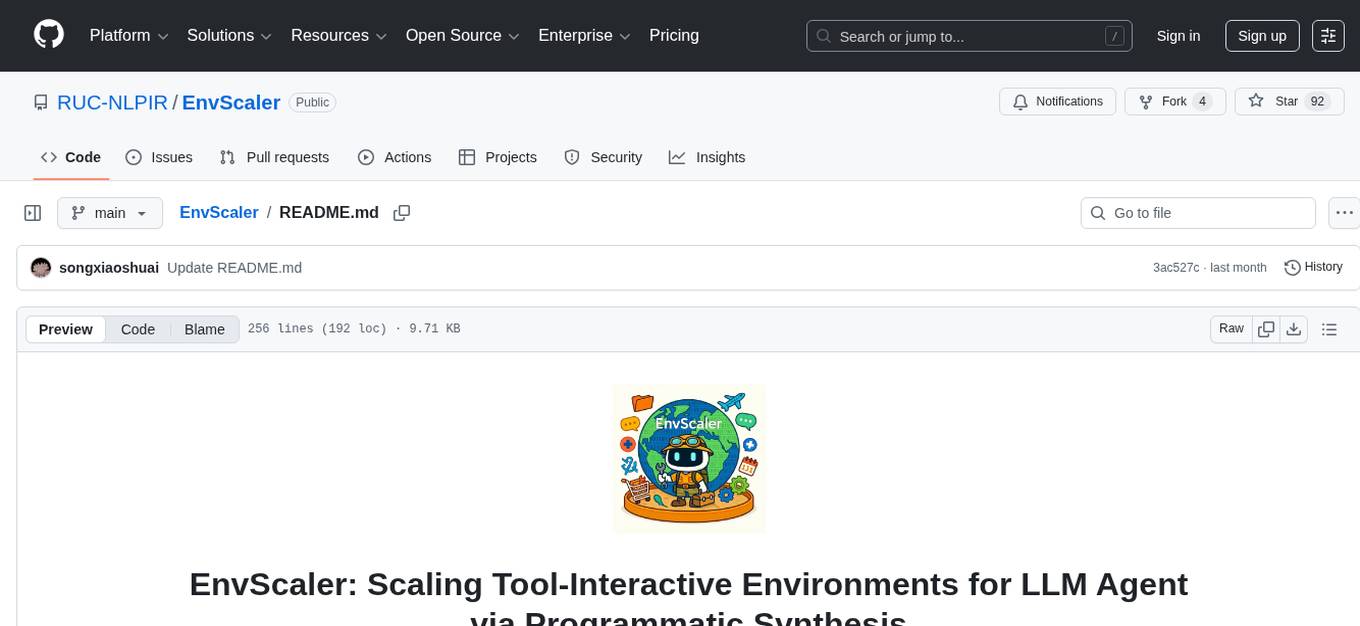
EnvScaler
EnvScaler is an automated, scalable framework that creates tool-interactive environments for training LLM agents. It consists of SkelBuilder for environment description mining and quality inspection, ScenGenerator for synthesizing multiple environment scenarios, and modules for supervised fine-tuning and reinforcement learning. The tool provides data, models, and evaluation guides for users to build, generate scenarios, collect training data, train models, and evaluate performance. Users can interact with environments, build environments from scratch, and improve LLMs' task-solving abilities in complex environments.
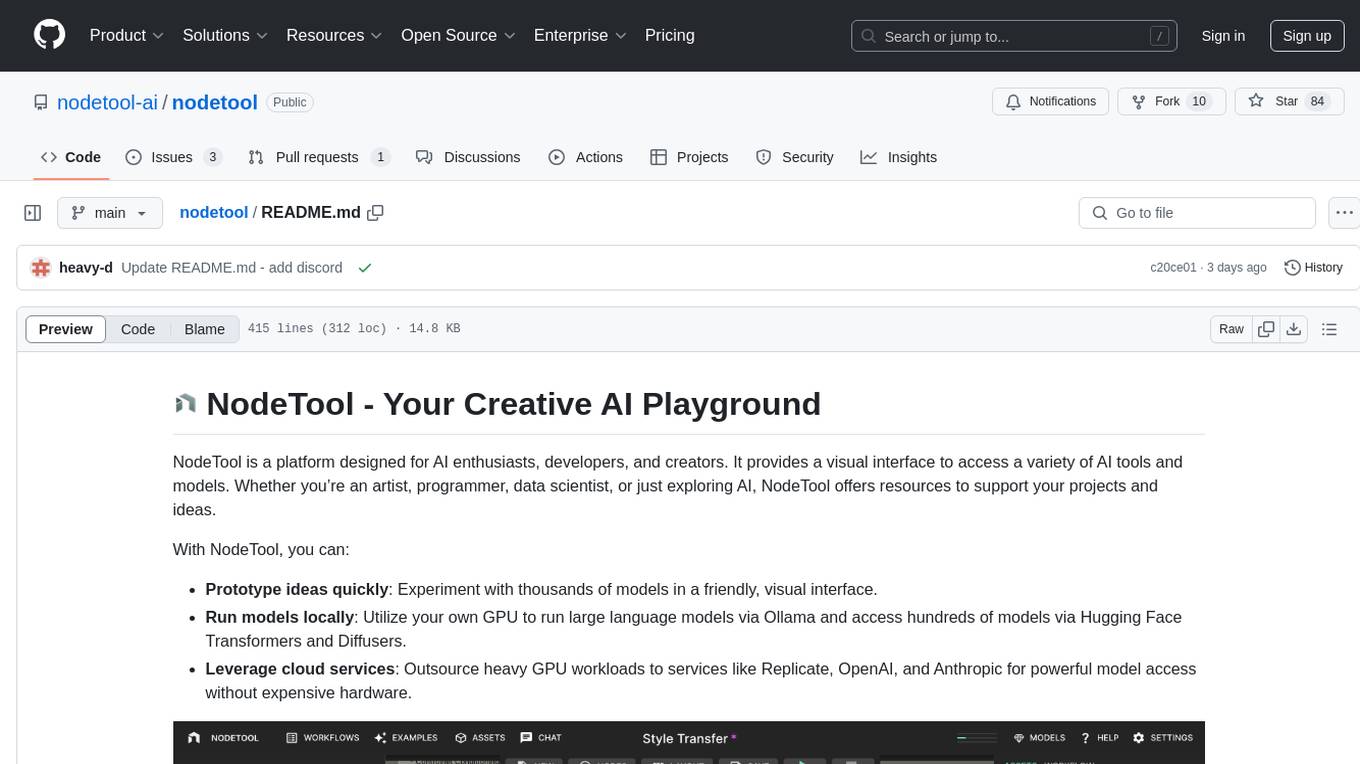
nodetool
NodeTool is a platform designed for AI enthusiasts, developers, and creators, providing a visual interface to access a variety of AI tools and models. It simplifies access to advanced AI technologies, offering resources for content creation, data analysis, automation, and more. With features like a visual editor, seamless integration with leading AI platforms, model manager, and API integration, NodeTool caters to both newcomers and experienced users in the AI field.
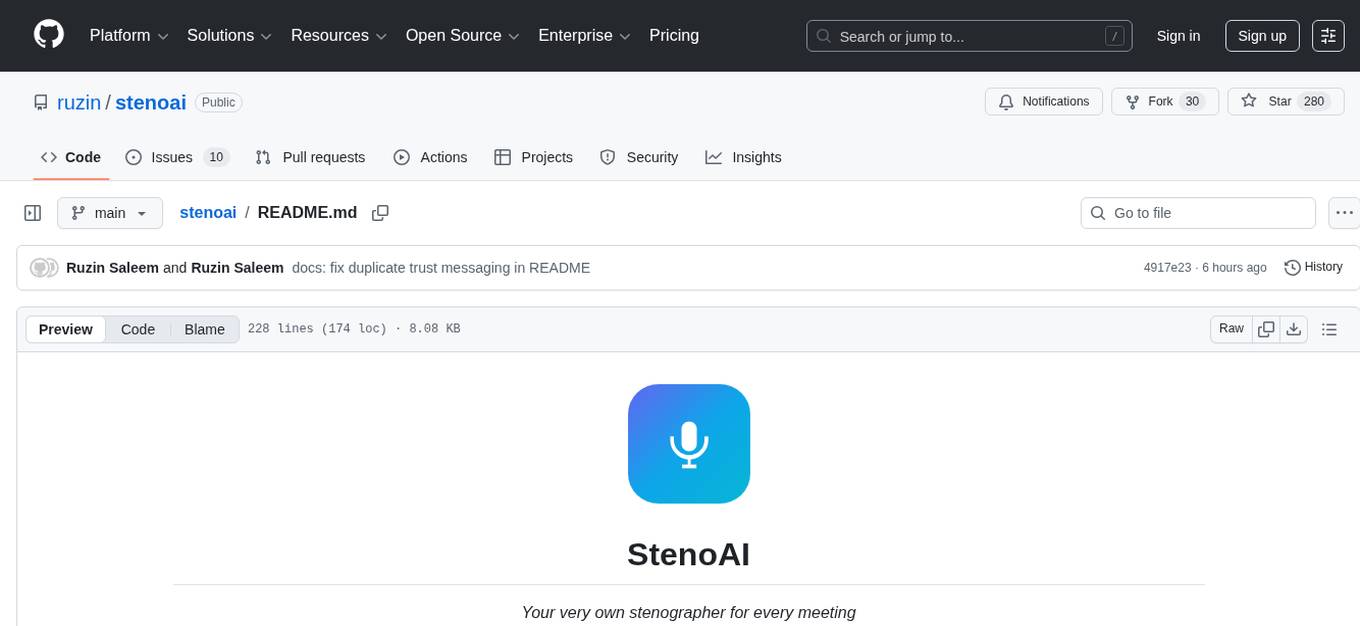
stenoai
StenoAI is an AI-powered meeting intelligence tool that allows users to record, transcribe, summarize, and query meetings using local AI models. It prioritizes privacy by processing data entirely on the user's device. The tool offers multiple AI models optimized for different use cases, making it ideal for healthcare, legal, and finance professionals with confidential data needs. StenoAI also features a macOS desktop app with a user-friendly interface, making it convenient for users to access its functionalities. The project is open-source and not affiliated with any specific company, emphasizing its focus on meeting-notes productivity and community collaboration.
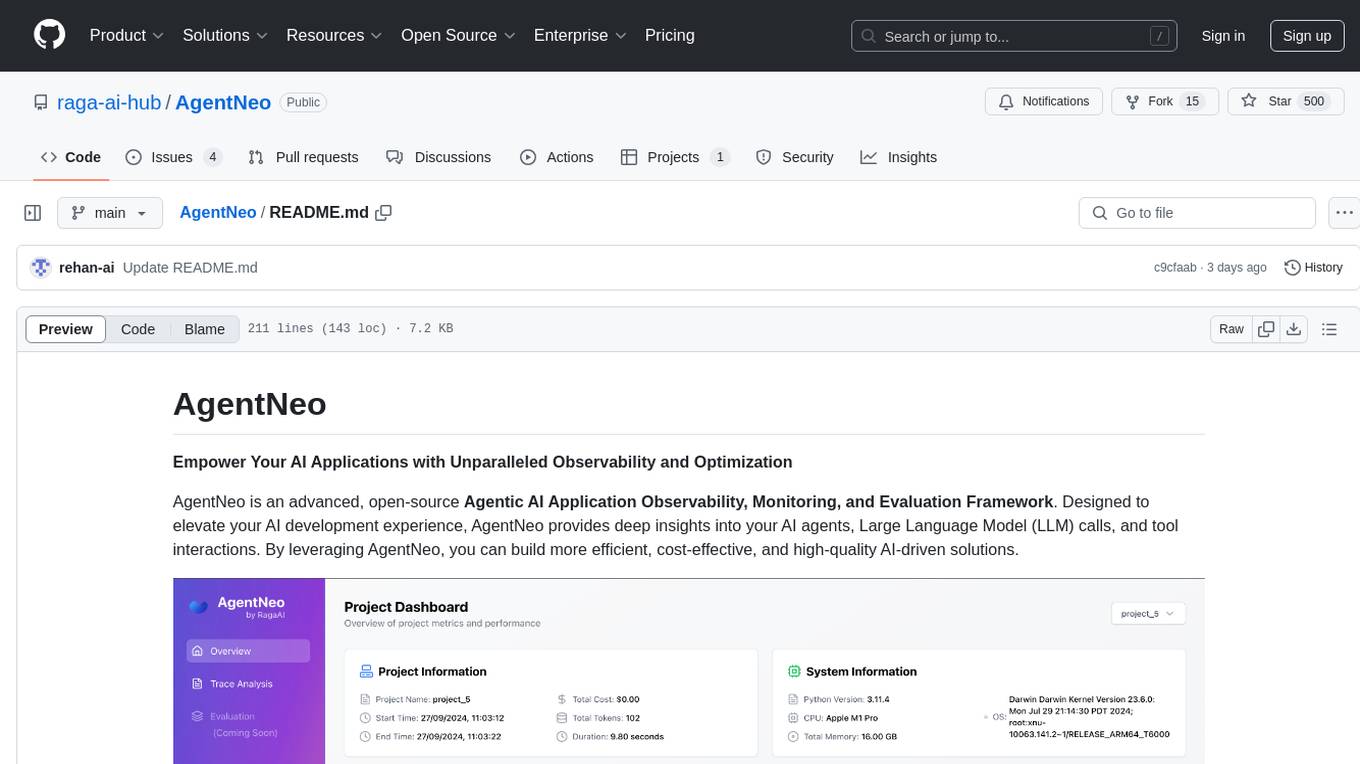
AgentNeo
AgentNeo is an advanced, open-source Agentic AI Application Observability, Monitoring, and Evaluation Framework designed to provide deep insights into AI agents, Large Language Model (LLM) calls, and tool interactions. It offers robust logging, visualization, and evaluation capabilities to help debug and optimize AI applications with ease. With features like tracing LLM calls, monitoring agents and tools, tracking interactions, detailed metrics collection, flexible data storage, simple instrumentation, interactive dashboard, project management, execution graph visualization, and evaluation tools, AgentNeo empowers users to build efficient, cost-effective, and high-quality AI-driven solutions.
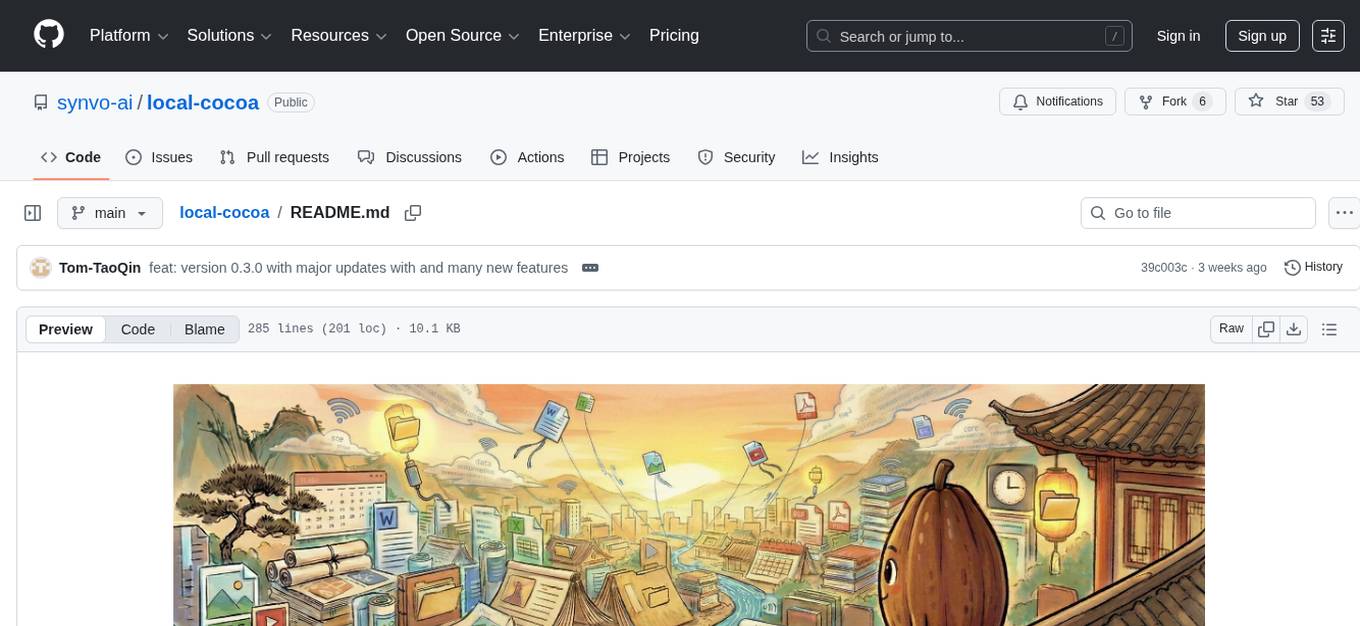
local-cocoa
Local Cocoa is a privacy-focused tool that runs entirely on your device, turning files into memory to spark insights and power actions. It offers features like fully local privacy, multimodal memory, vector-powered retrieval, intelligent indexing, vision understanding, hardware acceleration, focused user experience, integrated notes, and auto-sync. The tool combines file ingestion, intelligent chunking, and local retrieval to build a private on-device knowledge system. The ultimate goal includes more connectors like Google Drive integration, voice mode for local speech-to-text interaction, and a plugin ecosystem for community tools and agents. Local Cocoa is built using Electron, React, TypeScript, FastAPI, llama.cpp, and Qdrant.
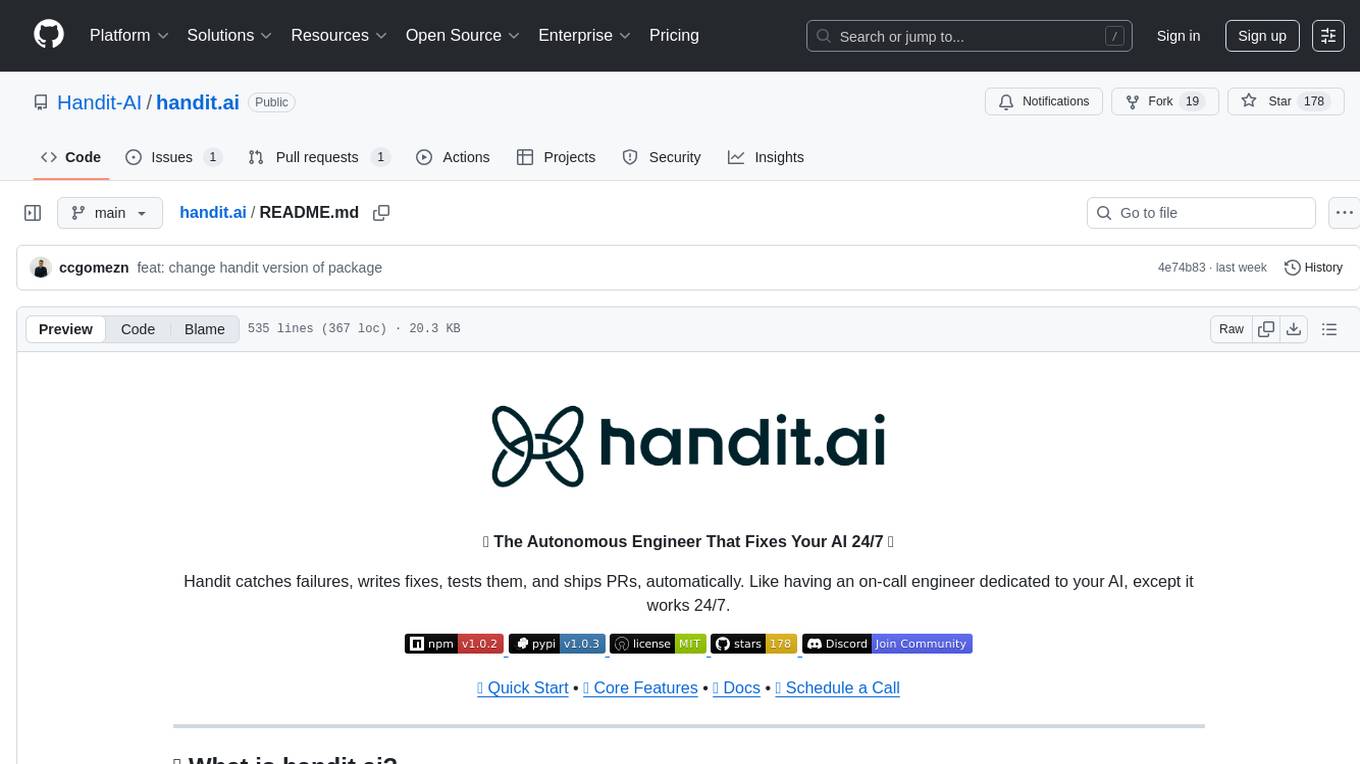
handit.ai
Handit.ai is an autonomous engineer tool designed to fix AI failures 24/7. It catches failures, writes fixes, tests them, and ships PRs automatically. It monitors AI applications, detects issues, generates fixes, tests them against real data, and ships them as pull requests—all automatically. Users can write JavaScript, TypeScript, Python, and more, and the tool automates what used to require manual debugging and firefighting.
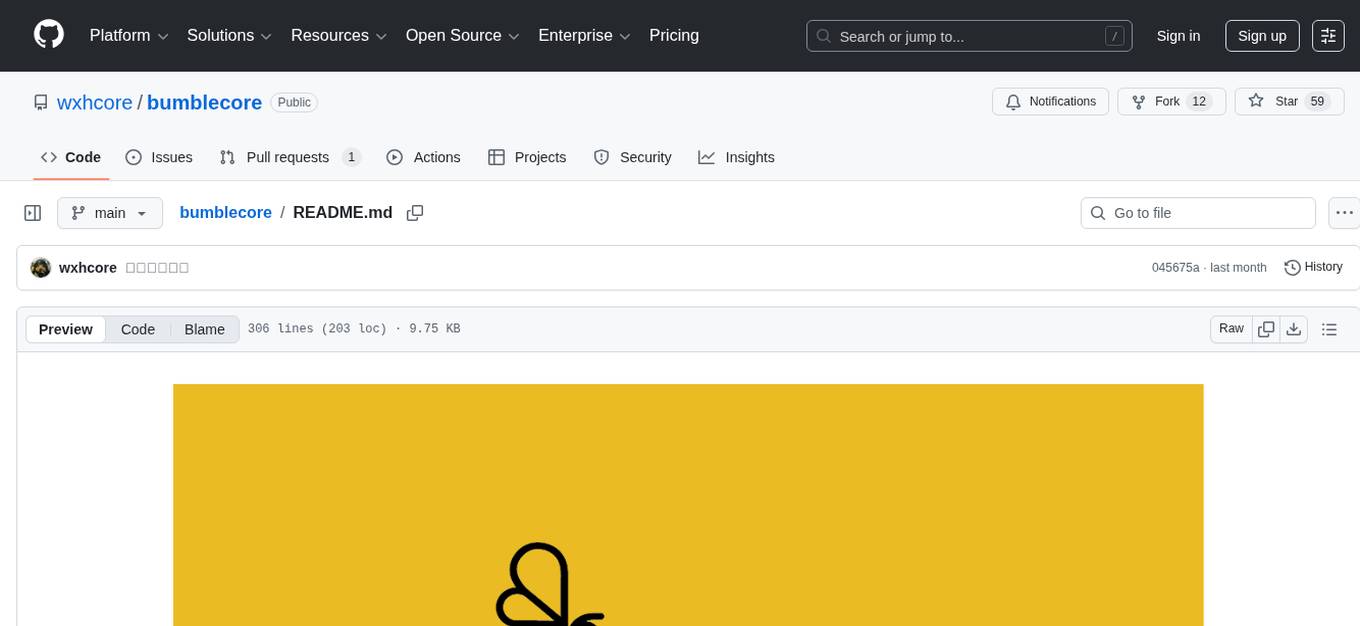
bumblecore
BumbleCore is a hands-on large language model training framework that allows complete control over every training detail. It provides manual training loop, customizable model architecture, and support for mainstream open-source models. The framework follows core principles of transparency, flexibility, and efficiency. BumbleCore is suitable for deep learning researchers, algorithm engineers, learners, and enterprise teams looking for customization and control over model training processes.
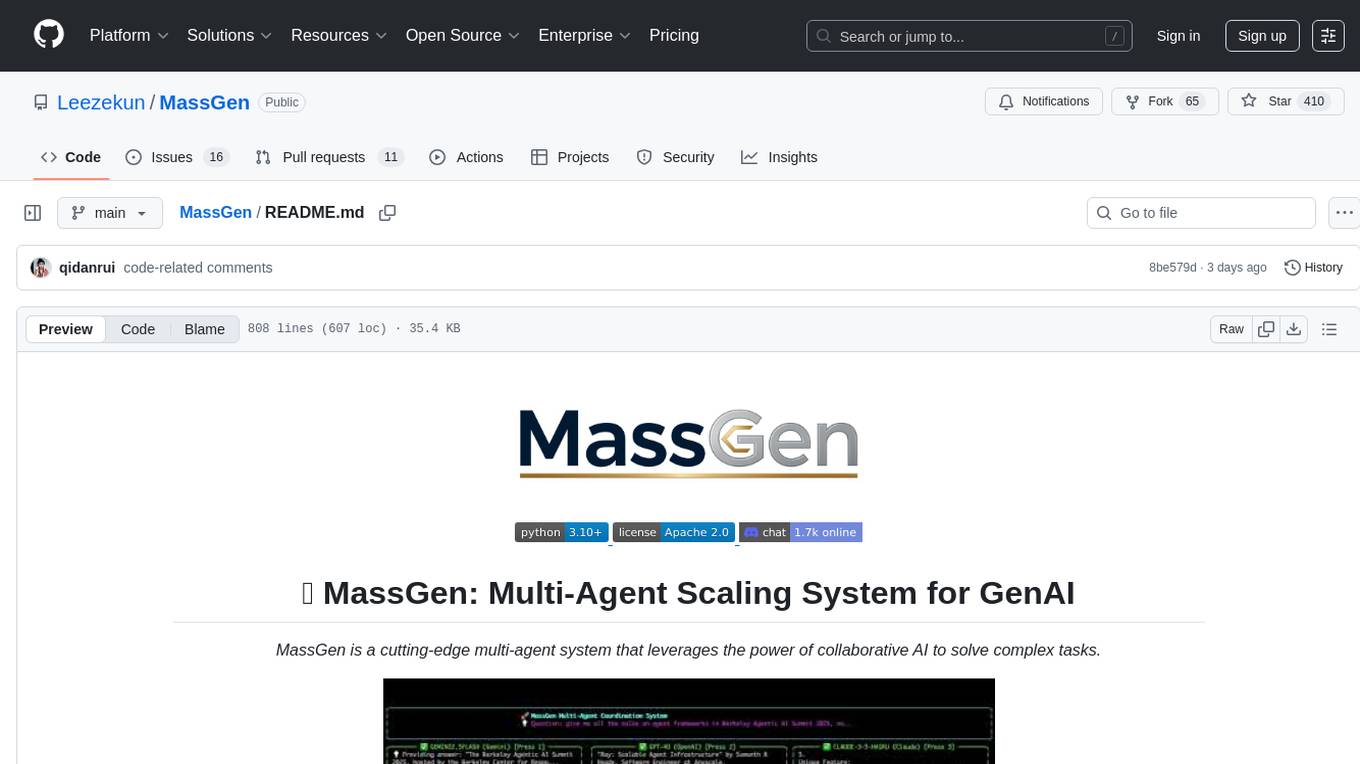
MassGen
MassGen is a cutting-edge multi-agent system that leverages the power of collaborative AI to solve complex tasks. It assigns a task to multiple AI agents who work in parallel, observe each other's progress, and refine their approaches to converge on the best solution to deliver a comprehensive and high-quality result. The system operates through an architecture designed for seamless multi-agent collaboration, with key features including cross-model/agent synergy, parallel processing, intelligence sharing, consensus building, and live visualization. Users can install the system, configure API settings, and run MassGen for various tasks such as question answering, creative writing, research, development & coding tasks, and web automation & browser tasks. The roadmap includes plans for advanced agent collaboration, expanded model, tool & agent integration, improved performance & scalability, enhanced developer experience, and a web interface.
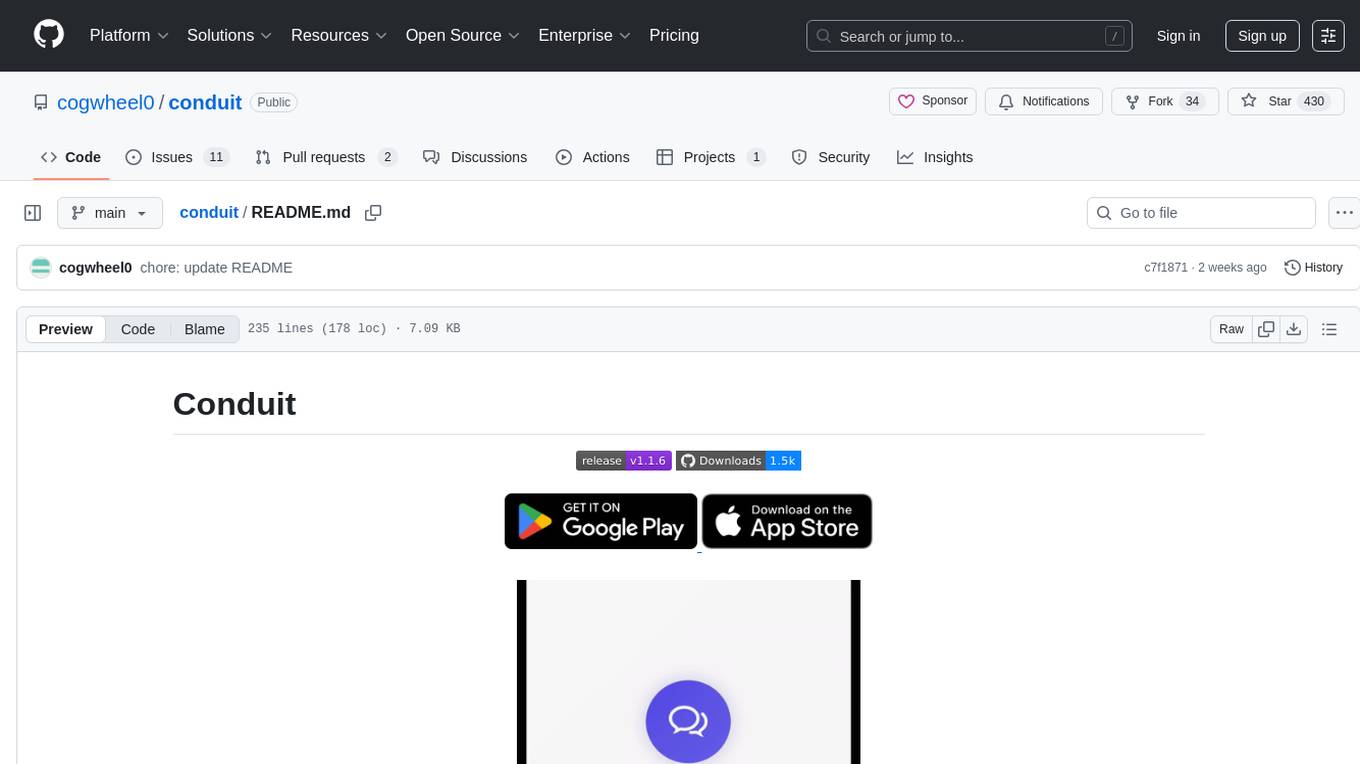
conduit
Conduit is an open-source, cross-platform mobile application for Open-WebUI, providing a native mobile experience for interacting with your self-hosted AI infrastructure. It supports real-time chat, model selection, conversation management, markdown rendering, theme support, voice input, file uploads, multi-modal support, secure storage, folder management, and tools invocation. Conduit offers multiple authentication flows and follows a clean architecture pattern with Riverpod for state management, Dio for HTTP networking, WebSocket for real-time streaming, and Flutter Secure Storage for credential management.
For similar tasks

RookieAI_yolov8
RookieAI_yolov8 is an open-source project designed for developers and users interested in utilizing YOLOv8 models for object detection tasks. The project provides instructions for setting up the required libraries and Pytorch, as well as guidance on using custom or official YOLOv8 models. Users can easily train their own models and integrate them with the software. The tool offers features for packaging the code, managing model files, and organizing the necessary resources for running the software. It also includes updates and optimizations for better performance and functionality, with a focus on FPS game aimbot functionalities. The project aims to provide a comprehensive solution for object detection tasks using YOLOv8 models.

VisionCraft
The VisionCraft API is a free API for using over 100 different AI models. From images to sound.

openvino
OpenVINO™ is an open-source toolkit for optimizing and deploying AI inference. It provides a common API to deliver inference solutions on various platforms, including CPU, GPU, NPU, and heterogeneous devices. OpenVINO™ supports pre-trained models from Open Model Zoo and popular frameworks like TensorFlow, PyTorch, and ONNX. Key components of OpenVINO™ include the OpenVINO™ Runtime, plugins for different hardware devices, frontends for reading models from native framework formats, and the OpenVINO Model Converter (OVC) for adjusting models for optimal execution on target devices.
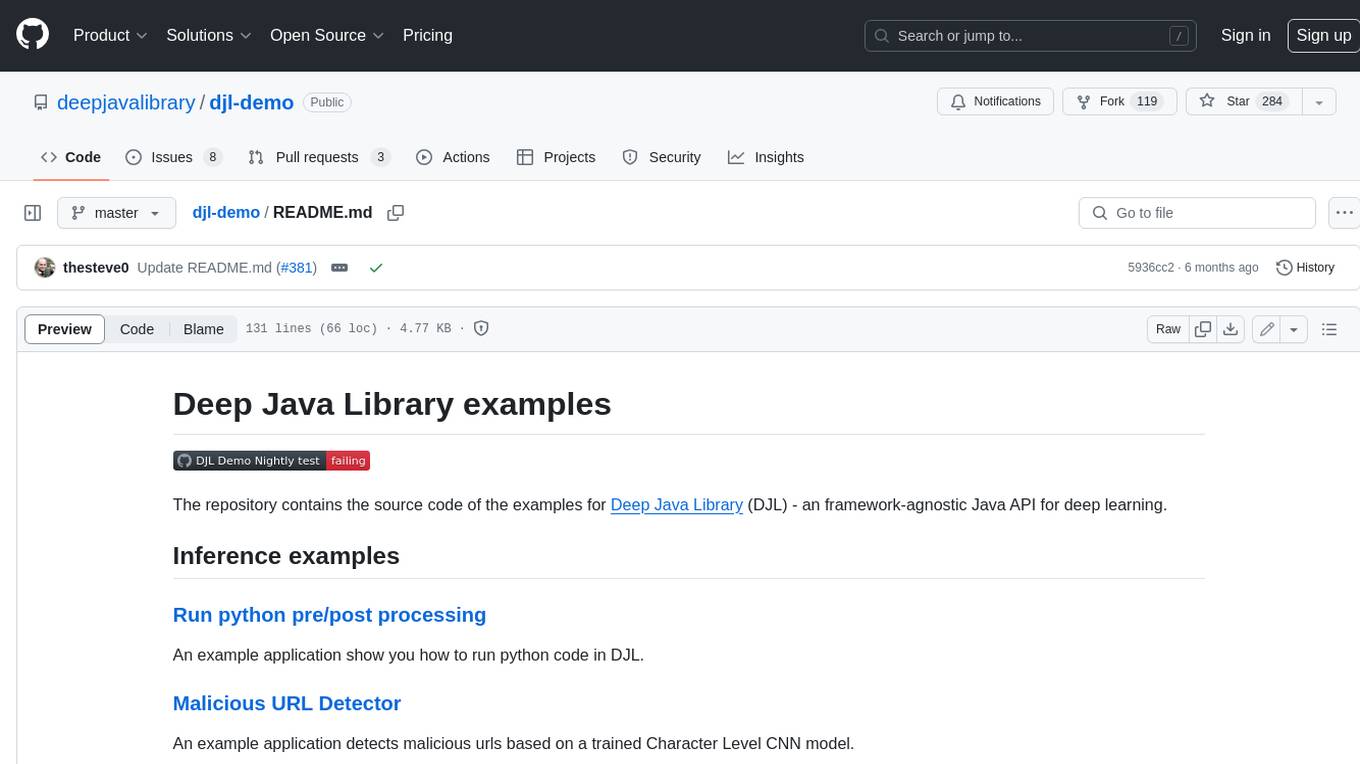
djl-demo
The Deep Java Library (DJL) is a framework-agnostic Java API for deep learning. It provides a unified interface to popular deep learning frameworks such as TensorFlow, PyTorch, and MXNet. DJL makes it easy to develop deep learning applications in Java, and it can be used for a variety of tasks, including image classification, object detection, natural language processing, and speech recognition.
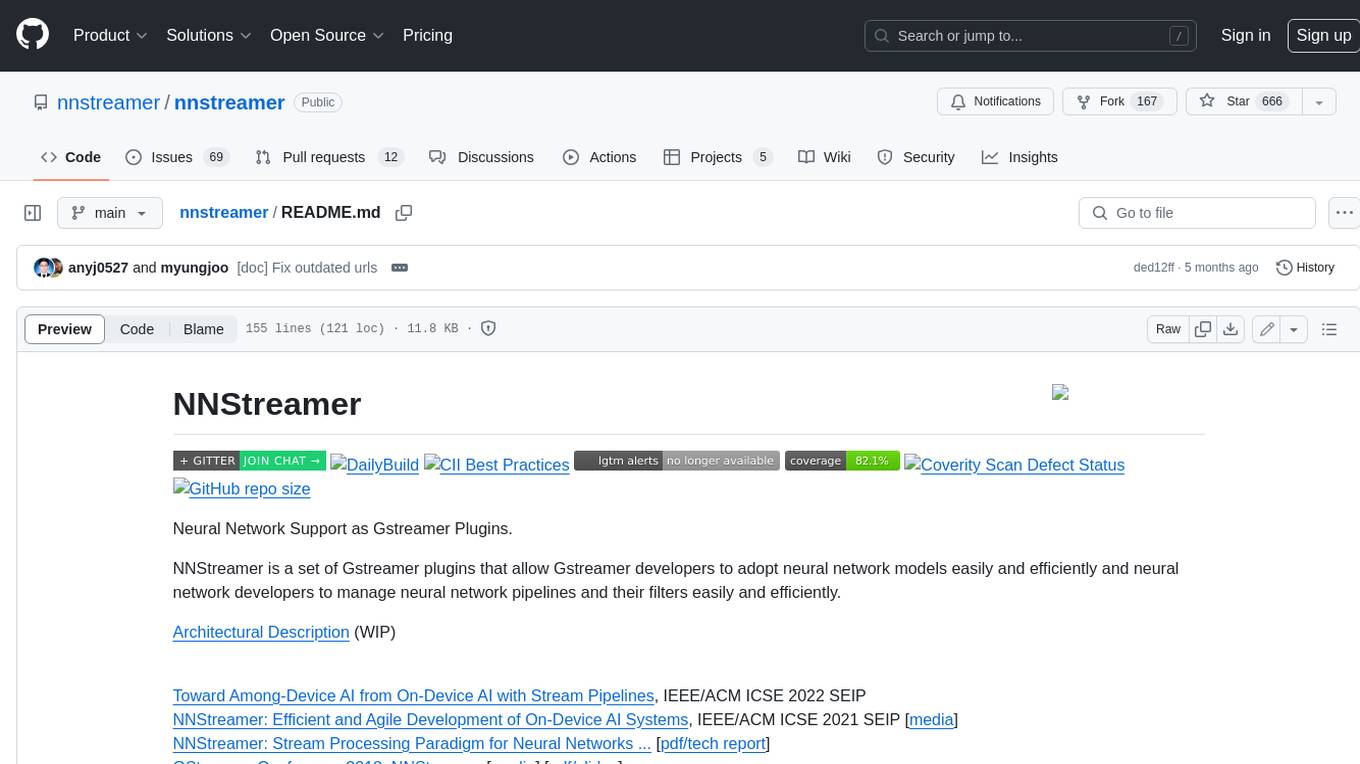
nnstreamer
NNStreamer is a set of Gstreamer plugins that allow Gstreamer developers to adopt neural network models easily and efficiently and neural network developers to manage neural network pipelines and their filters easily and efficiently.
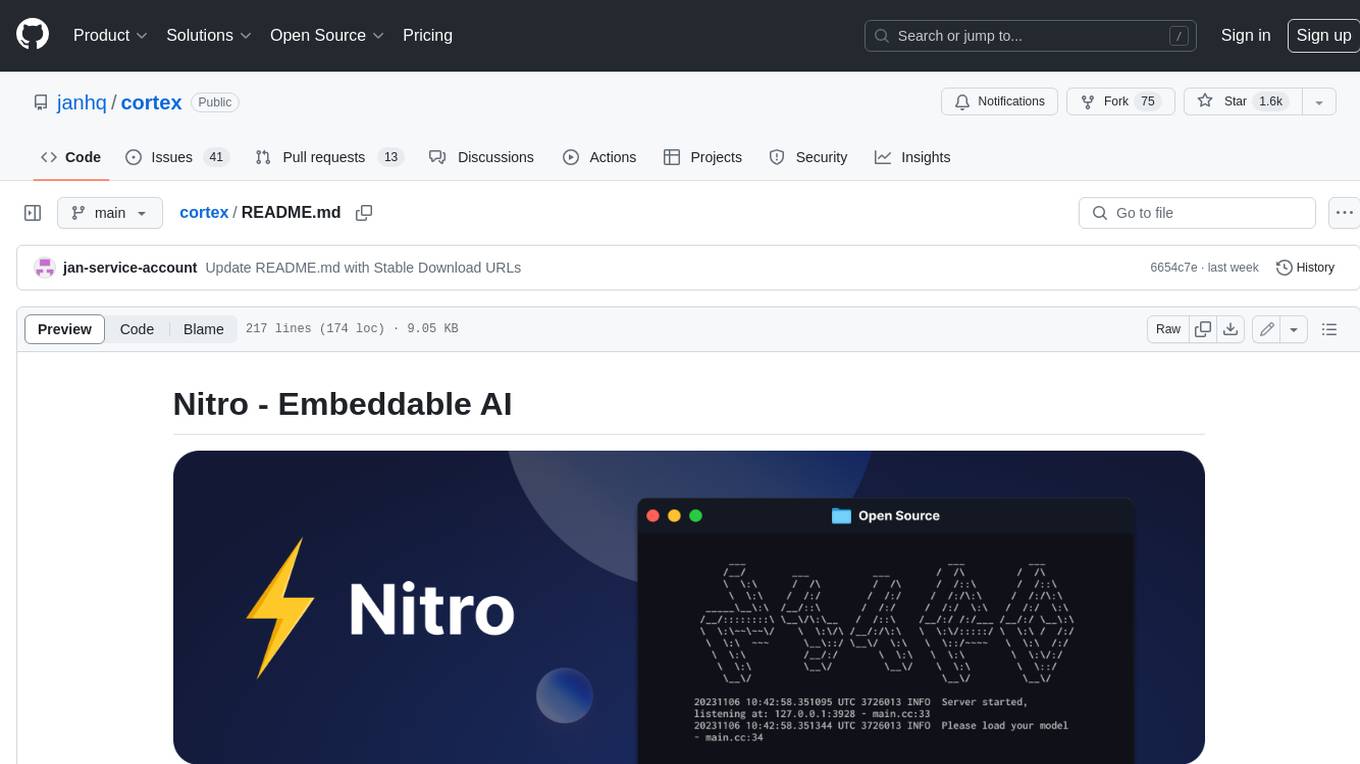
cortex
Nitro is a high-efficiency C++ inference engine for edge computing, powering Jan. It is lightweight and embeddable, ideal for product integration. The binary of nitro after zipped is only ~3mb in size with none to minimal dependencies (if you use a GPU need CUDA for example) make it desirable for any edge/server deployment.
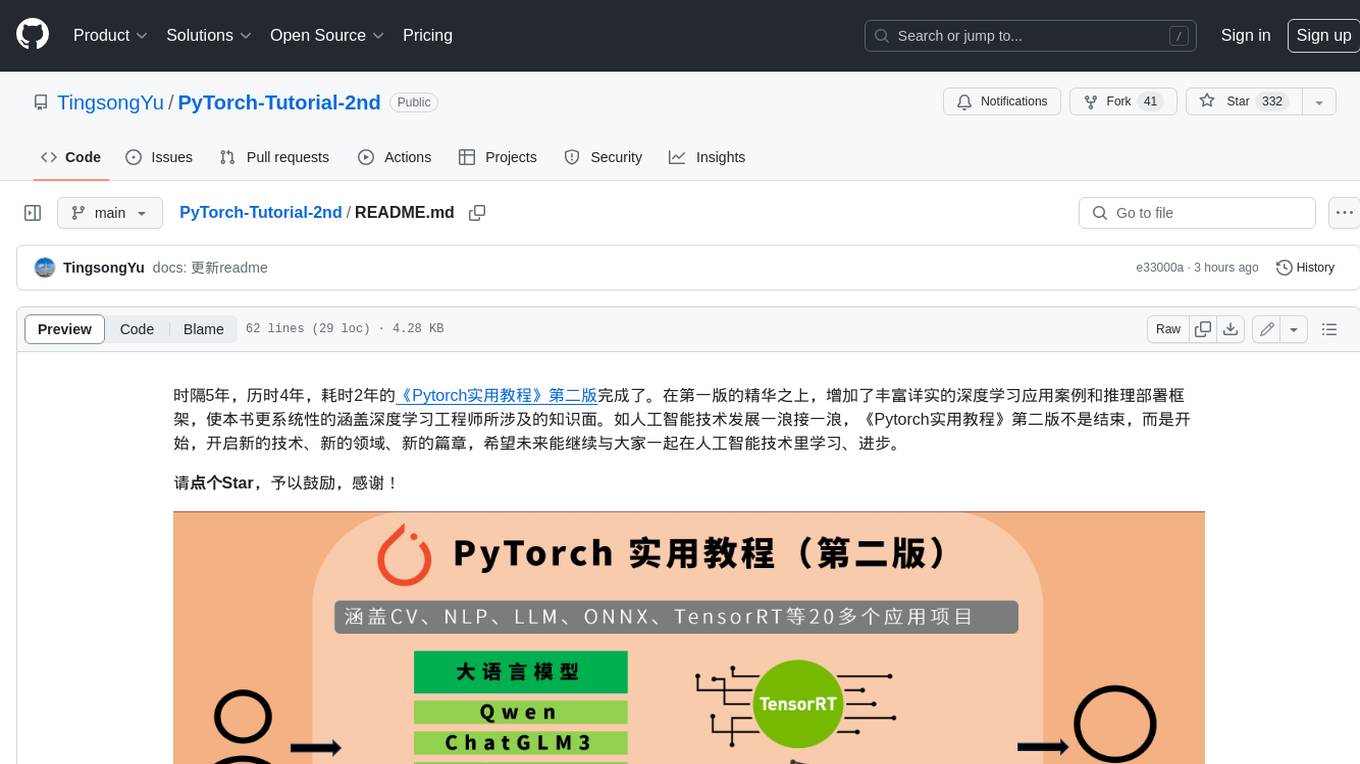
PyTorch-Tutorial-2nd
The second edition of "PyTorch Practical Tutorial" was completed after 5 years, 4 years, and 2 years. On the basis of the essence of the first edition, rich and detailed deep learning application cases and reasoning deployment frameworks have been added, so that this book can more systematically cover the knowledge involved in deep learning engineers. As the development of artificial intelligence technology continues to emerge, the second edition of "PyTorch Practical Tutorial" is not the end, but the beginning, opening up new technologies, new fields, and new chapters. I hope to continue learning and making progress in artificial intelligence technology with you in the future.
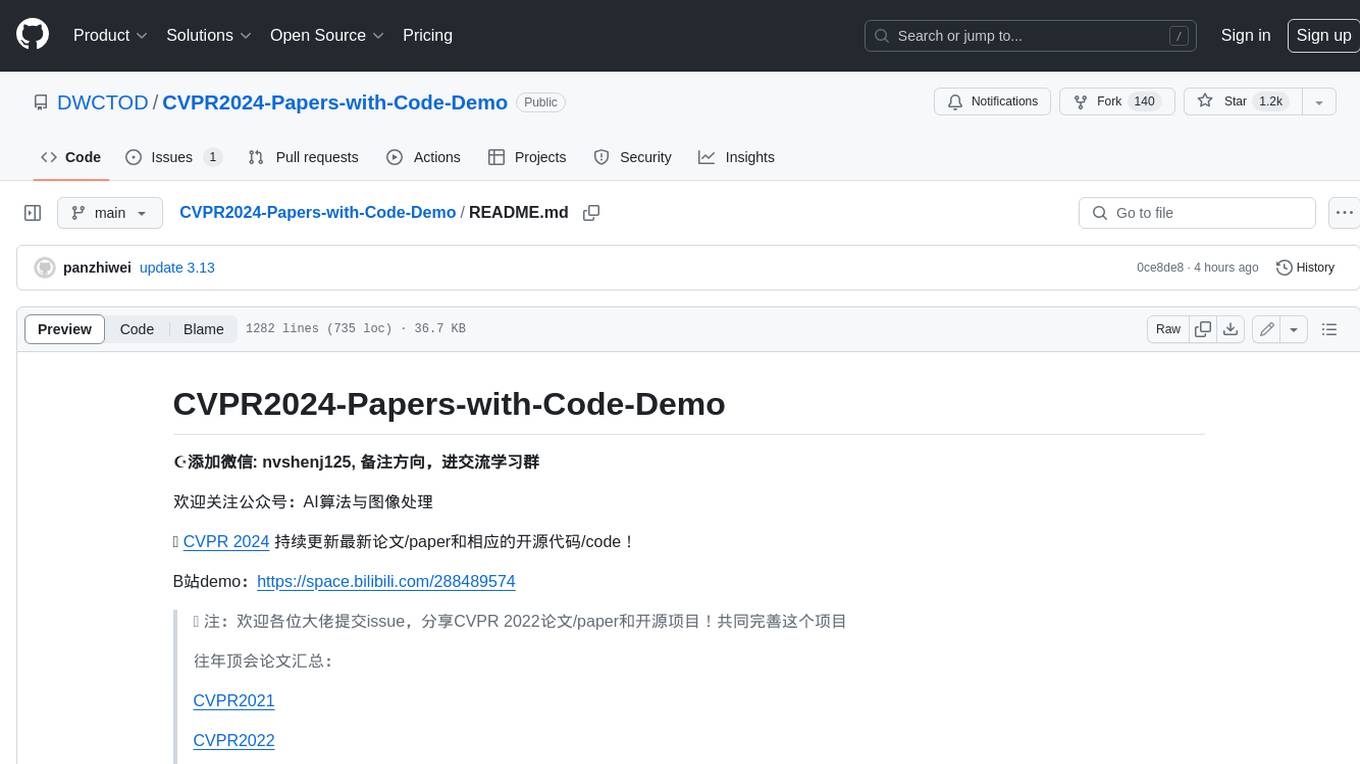
CVPR2024-Papers-with-Code-Demo
This repository contains a collection of papers and code for the CVPR 2024 conference. The papers cover a wide range of topics in computer vision, including object detection, image segmentation, image generation, and video analysis. The code provides implementations of the algorithms described in the papers, making it easy for researchers and practitioners to reproduce the results and build upon the work of others. The repository is maintained by a team of researchers at the University of California, Berkeley.
For similar jobs

weave
Weave is a toolkit for developing Generative AI applications, built by Weights & Biases. With Weave, you can log and debug language model inputs, outputs, and traces; build rigorous, apples-to-apples evaluations for language model use cases; and organize all the information generated across the LLM workflow, from experimentation to evaluations to production. Weave aims to bring rigor, best-practices, and composability to the inherently experimental process of developing Generative AI software, without introducing cognitive overhead.

LLMStack
LLMStack is a no-code platform for building generative AI agents, workflows, and chatbots. It allows users to connect their own data, internal tools, and GPT-powered models without any coding experience. LLMStack can be deployed to the cloud or on-premise and can be accessed via HTTP API or triggered from Slack or Discord.

VisionCraft
The VisionCraft API is a free API for using over 100 different AI models. From images to sound.

kaito
Kaito is an operator that automates the AI/ML inference model deployment in a Kubernetes cluster. It manages large model files using container images, avoids tuning deployment parameters to fit GPU hardware by providing preset configurations, auto-provisions GPU nodes based on model requirements, and hosts large model images in the public Microsoft Container Registry (MCR) if the license allows. Using Kaito, the workflow of onboarding large AI inference models in Kubernetes is largely simplified.

PyRIT
PyRIT is an open access automation framework designed to empower security professionals and ML engineers to red team foundation models and their applications. It automates AI Red Teaming tasks to allow operators to focus on more complicated and time-consuming tasks and can also identify security harms such as misuse (e.g., malware generation, jailbreaking), and privacy harms (e.g., identity theft). The goal is to allow researchers to have a baseline of how well their model and entire inference pipeline is doing against different harm categories and to be able to compare that baseline to future iterations of their model. This allows them to have empirical data on how well their model is doing today, and detect any degradation of performance based on future improvements.

tabby
Tabby is a self-hosted AI coding assistant, offering an open-source and on-premises alternative to GitHub Copilot. It boasts several key features: * Self-contained, with no need for a DBMS or cloud service. * OpenAPI interface, easy to integrate with existing infrastructure (e.g Cloud IDE). * Supports consumer-grade GPUs.

spear
SPEAR (Simulator for Photorealistic Embodied AI Research) is a powerful tool for training embodied agents. It features 300 unique virtual indoor environments with 2,566 unique rooms and 17,234 unique objects that can be manipulated individually. Each environment is designed by a professional artist and features detailed geometry, photorealistic materials, and a unique floor plan and object layout. SPEAR is implemented as Unreal Engine assets and provides an OpenAI Gym interface for interacting with the environments via Python.

Magick
Magick is a groundbreaking visual AIDE (Artificial Intelligence Development Environment) for no-code data pipelines and multimodal agents. Magick can connect to other services and comes with nodes and templates well-suited for intelligent agents, chatbots, complex reasoning systems and realistic characters.

